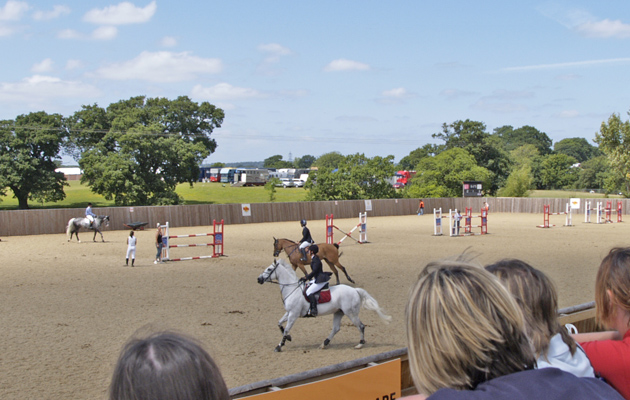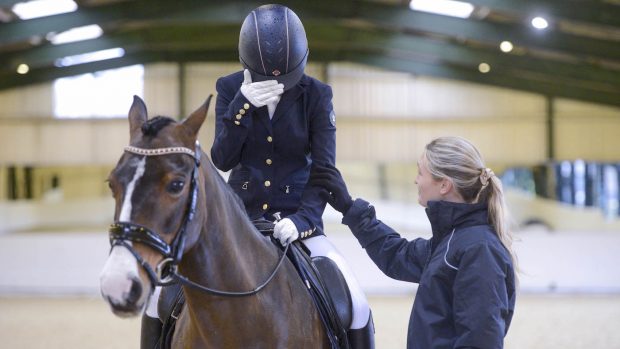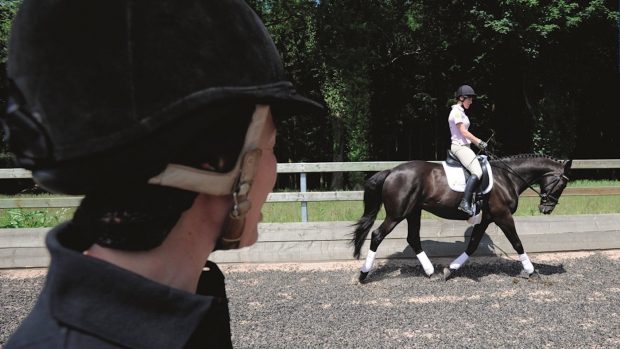If you find your nerves are preventing you from enjoying your time in the saddle, know you are not alone – the good news is that rider confidence coach Sue Gould-Wright has some useful tips that can help nervous horse riders.
While in some cases riders’ nerves can be traced back to a bad experience, such as a fall, sometimes a loss of confidence can appear for no obvious reason, which can be particularly frustrating. This is a situation that Sue has plenty of experience with, and she believes it’s important for a nervous horse riders to understand the role different parts of their brain plays.
Sue explains: “There is probably a part of you who is trying to tell yourself that there is no need to be concerned, you KNOW that you are capable and can cope with whatever happens. So what on earth is going on? Well, I can tell you that your rational brain is being hijacked by Amy and a Reptile!
“We evolved from reptiles and our brain stem is a throw-back to that evolutionary process, which is why it is referred to as the reptilian brain. This part of our brain is instinctive and doesn’t have the capability to think about things rationally; its response is just what you see in reptiles today — flight, fight or freeze.
“So who the heck is Amy and how does she fit in? Amy is a part of your mammalian brain, again a throwback to our evolution but from a later stage in the process, from mammals this time. Amy is an abbreviation I concocted to refer to a part of the mammalian brain called the amygdala.
“This more evolved part of your brain does have some degree of rational thought, but the content of the amygdala may have you believing otherwise… Amy holds all those fearful, painful memories, a bit like an old haunted house rattling with ghosts of the past.”
So, if these parts of our brain are working against nervous horse riders, how can the rational brain help?
“The rational, useful, thinking part of the brain is the voice (being drowned out by Amy’s incessant chattering) telling you that you KNOW you can deal with anything that your horse offers you — your neocortex. Your neocortex has the ability to rationally evaluate situations and take the appropriate action(s). However what can happen is Amy can become too reactive; you develop what is known as a ‘hot amygdala’.
“Amy’s response also triggers the area of your brain responsible for releasing hormones such as adrenaline; so often the physical symptoms of fear due to hormone release (increased heart rate, shaky legs, shallow breathing) can make us less able to think rationally… and so the downward spiral of fear and anxiety continues.”
So now you know about “Amy” and “the Reptile”, you can understand that you aren’t going mad – it’s simply that there are things working away in your head, which are trying to protect you, but in reality they are interfering with your ability to enjoy your riding. So now you understand that, you can start to take control again.
Tips for nervous horse riders from Sue Gould-Wright
1. WHOA! As soon as you hear those niggling voices of doom, shout “whoa!”, “No!”, “Amy!” or whatever works for you; you have a split second to take control and stop the release of those jelly-leg hormones (you can shout out loud or in your head — either works!)
2. Breathe: take a big breath in and sigh as you breathe out. Do this a couple of times, then take normal size breaths in, but continue to sigh as you breathe out. If you’re with your horse, they may also respond to the outward sigh as a signal that all is calm, panic over.
3. Count your breath: breathe in one, out two, in three, out four, etc. until you reach 10 and then you start over again at one. This focuses your attention elsewhere and helps you to control your breathing rate; the slower your breathing, the more your heart rate will lower.
4. Do a top-to-toe scan of your body to check for physical tension:
- Face and jaw are relaxed
- Shoulders away from ears
- Ribcage relaxed, not lifted and tense
- Elbows heavy and hands soft
- Backside isn’t clenching
- Thighs heavy and lengthened downwards
- Lower leg relaxed
5. Focus your gaze on the area between your horse’s ears, not a ferocious stare but a soft, almost out-of-focus, supportive gaze so he knows you are just paying attention to him and not the scary thing. You can do this out of the saddle too by finding a part of him to focus on rather than looking around you, which will unsettle you both.
6. Count your hip swings; as the horse walks he will move your pelvis side to side, the more relaxed you are the easier it is for him to do so. Count to 10 and then start again. You can then use this hip swing to slow his gait too, slow your swing — he slows too. If you are on foot, just count your strides instead.
7. Start small: if you are feeling anxious about riding, try breaking it down into small, achievable steps:
- Tack up, get on and get off again
- Tack up, lead your horse on foot for a short distance in hand
- Tack up, get on, walk a short distance with someone you trust on foot beside you, then finish
- Each time, increase the distance/period you ride while having someone to trust on hand
- Once you’re confidence increases, repeat the steps without your trusted friend with you
8. Continue with these small steps, remembering that it needs to be at YOUR pace, nobody else’s — it has to feel right for you. So long as you are making progress it does not matter what anyone else thinks or says.
Like this? You might also enjoy reading these:

Transform rider nerves into positive energy with Charlie Unwin’s expert tips

‘He was going berserk’: how to overcome a traumatic accident

7 ways top riders deal with nerves

Subscribe to Horse & Hound magazine today – and enjoy unlimited website access all year round
Stay in touch with all the news in the run-up to and throughout the Paris Olympics, Royal International, Burghley and more with a Horse & Hound subscription. Subscribe today for all you need to know ahead of these major events, plus online reports on the action as it happens from our expert team of reporters and in-depth analysis in our special commemorative magazines. Have a subscription already? Set up your unlimited website access now



